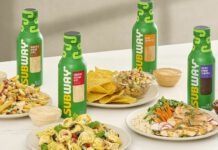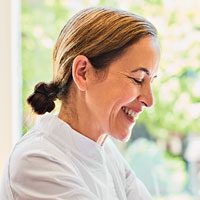
CORINNA MOZO
Corinna Mozo was a dancer for 20 years before becoming a chef. Now, she’s the owner of the Toronto cult-favourite La Cubana (and French-cuisine-based Delux before that).
Mozo still loves to experiment in the kitchen — though her hours are much better compared to her early years spent in the Boston culinary scene. A graduate of the prestigious Stratford Chefs School, Mozo sought out female chefs to emulate after hearing so much negativity about the sexist climate of the culinary world. That instinct set her on a path for success, even finding a fan in Julia Child.
She opened La Cubana in Toronto’s Roncesvalles Village with her husband Victor Coelho in 2013, not expecting its almost-immediate popularity. Not all her employees and trained chefs were familiar with the ingredients. Many of them were taken aback when Mozo presented a key menu item — conch.
The slimy, mollusk may look creepy in the raw, but Mozo knew its potential after having worked for decades at Lydia Shire’s Biba in Boston. Conch is a popular ingredient in Cuban cuisine, though Mozo rarely ate it when she visited home — since the family could only have access to foods available during rationing.
Still, Mozo says her Cuban family’s ability to create delicious meals out of very little inspired her. Growing up with a young Cuban father, Mozo recalls a household where people were always visiting. She says the French culture she experienced living in Montreal had a big impact — people were less rushed and truly enjoyed entertaining, socializing and dining.
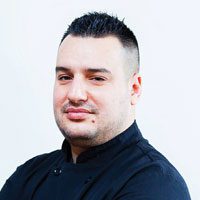
ELIAS SALAZAR
Elias Salazar’s mamita Perla taught him much of what he knows as a chef. Toronto’s ambassador of modernist Peruvian cuisine loves the city in part because the population is united by its diversity — just like Peru.
Due to the economic and political instability of Peru in the mid-’90s, his family immigrated to Canada in 1997 from the port city of Callao. Once in Toronto, he saw the incremental growth of existing Peruvian restaurants and knew he could give the traditional cuisine his own modern twist. After working in the kitchens of Lima and Miami, Salazar cooked in Montreal and Toronto, where he finally decided to strike out on his own. His catering business, Limon Modern Peruvian, was his big break. The 2017 opening of his restaurant Kay Pacha (which roughly translates to ‘from the earth’) was a huge success. It was listed as one of Toronto Life’s Top 20 Restaurants in its annual review.
Few people know the depth and breadth of the culinary history of Peru. It’s been named the Best Culinary Destination in the world for five years in a row by World Travel Awards. Salazar says the collection of Peruvian recipes is so vast you couldn’t get through a quarter of them if you cooked steadily for a year. It’s part of what keeps him inspired to introduce Toronto foodies to the next Peruvian dish.
Now Salazar is launching the concept “Waska” — which means to “eat, drink and enjoy.” The restaurant (opening in late 2019) and product series will feature Peruvian-specific ingredients. Salazar saw a gap in the market for products that weren’t available here — such as purple corn. He’s also releasing a series of chili sauces.
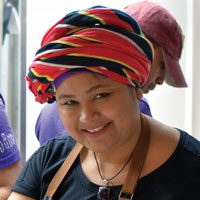
NUIT REGULAR
Credited with reinvigorating the Toronto Thai scene over the past 10 years, Nuit Regular has served up dishes foodies never knew they needed. The chef, whose our Sukhothai locations introduced guests to a now-famous dish, khao soi (a rich coconut broth with homemade egg noodles), has now opened Kiin. The new concept features Royal Thai cuisine — a type of cuisine Regular says was on the verge of extinction. Royal Thai cuisine is an artful cooking that looks nothing like food any North American would recognize. In fact, it could easily be mistaken for an art piece if it were placed on a pedestal in a gallery setting.
Unlike most celebrated chefs, Regular was never formally trained. Her mother was the source of nearly all her cooking techniques and curry-paste recipes. As a young girl, Regular’s family was poor and she was required to cook side-by-side with her mother and help distribute and sell the food to earn money for the family. Regular went to nursing school and even worked for a period of time as a nurse. But, her passion for cooking and the chance meeting with a backpacker led her on a different path.
Regular had been working as a nurse at the Pai hospital when she met her future husband (and current restaurant co-owner) Jeff Regular. Now the owners of Pai Northern Thai Kitchen, Sabai Sabai, Sukhothai and Kiin, her restaurants consistently rate among the best in city reviews. She has also been a guest judge on Masterchef Canada. The government of Thailand has also recognized her cooking and awarded her restaurants the prestigious Thai-Select-Premium designation for her food’s authenticity.
To maintain the consistency of her cuisine across so many restaurants, Regular invests in training her chefs properly. So active are the chefs at Kiin that Regular built a mini-waterfall behind the grill to keep everyone cool.

WALLACE WONG
A graduate of Conestoga’s School of Hospitality & Culinary Arts, Wallace Wong first appeared on the Food Network at the young age of 23. He won the second season of Chopped Canada in 2015 and returned in 2017 for the show Bake It Possible, finishing as one of the top-10 finalists. Recently, Wong was a finalist for the 2019 Top Chef Canada.
You might say the competitive streak in Wong led him on a path to the television business. While at Conestoga, he was the gold-medal winner at the Ontario Technological Skills Competition and a bronze-medal winner at the National Competition where he represented all of Ontario.
Today Wong is known as the Six Pack Chef. He’s a professional body builder (he was a self-described chubby kid), as well as a food-product entrepreneur, guest speaker, culinary consultant and chef. Still in his late-20s, Wong has plenty of time to take over Toronto’s food scene. With a close friend, Wong founded a mecca for breakfast sandwiches in Kensington Market called Eggs BAE (eggs before all else).
But don’t underestimate the culinary prowess on display. Wong’s breakfast sandwiches come on brioche baked in-house and feature gourmet ingredients such as Muenster cheese, homemade tomato jam, free-range eggs, slow-cooked onions and house-cured citrus-pepper salmon.
The ambitious 28-year old has also started an e-commerce sauce company, FlavurLust. Wong’s extreme multitasking came from a cancer-scare he had in his last year of high school. He completed his chemo and radiation while still attending school so he could graduate with his class. His next amazing feat was somehow managing to attend college and university at the same time. He earned his culinary diploma at Conestoga College and a business degree at Wilfred Laurier University.
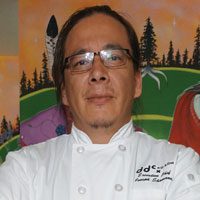
JOSEPH SHAWANA
Most people don’t know the real history of Canadian cuisine — its Indigenous dishes — but Toronto-based Joseph Shawana at Ku Kum Kitchen is changing all that. He’s shaken up the food scene and brought new (but historical) ingredients to the city and the buzz is palpable.
Shawana is Odawa, part of the Three Fires Confederacy, and grew up on the Wiikwemkoong Unceded Reserve on Ontario’s Manitoulin Island. As a child, he foraged for wild ingredients, such as berries, walnuts and morels — it was part of daily life. While the women on the reserve cooked full meals on open fires, the men went out and hunted for wild game. The strength and independence of the women in his life — his mother, grandma and aunties — had the biggest impact on Shawana and his restaurant’s name “Ku Kum” (meaning grandmother) is a testament to that. Ku Kum Kitchen features a colourful mural depicting three First-Nations’ women standing in a river while fish jump around them.
Watching his mother and grandmother cook and run the food booths at various festivals and Pow Wows, Shawana found his inspiration. He also credits the strength and encouragement of his wife (who is Cree), who pushed him to use Indigenous ingredients and take the culinary risk to shift away from the explicitly French cooking methods he’d learned in culinary school.
After working as executive chef at the Rogers Centre and the Direct Energy Centre, Shawana worked at Snakes and Lattes, where he began to experiment with Indigenous ingredients — not expecting it to take off the way it did. That led to Ku Kum Kitchen, a 27-seat dining room that regularly serves meals of pulled caribou wrapped in caul fat or bouillabaisse with local fish in cedar-and-anise broth. Other ingredients include fir tips, sweetgrass and seal (a tribute to Inuit cooking). Cedar tea (a common health remedy on his reserve) is available to everyone — even people walking by who just want to get warm.
By Jennifer Febbraro



